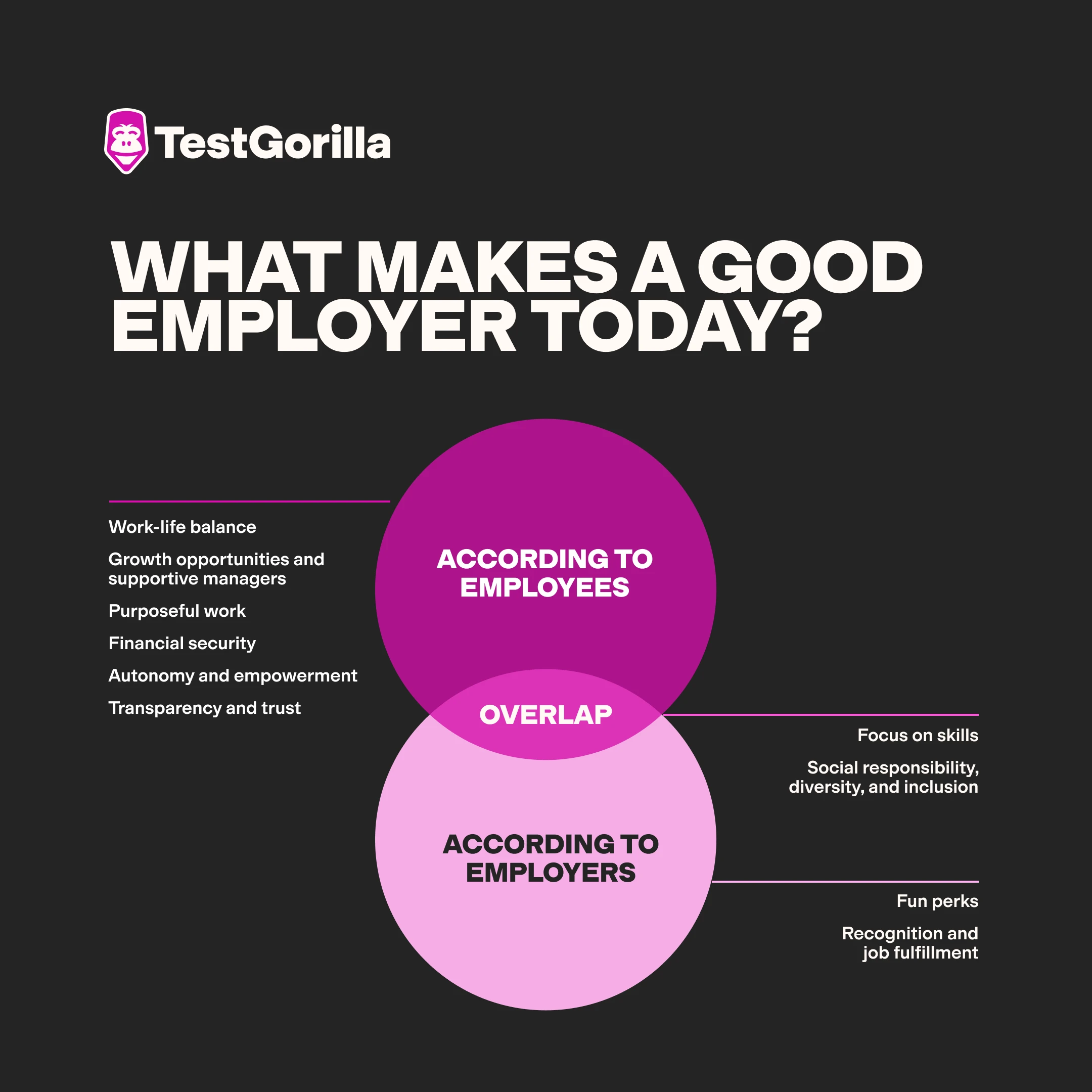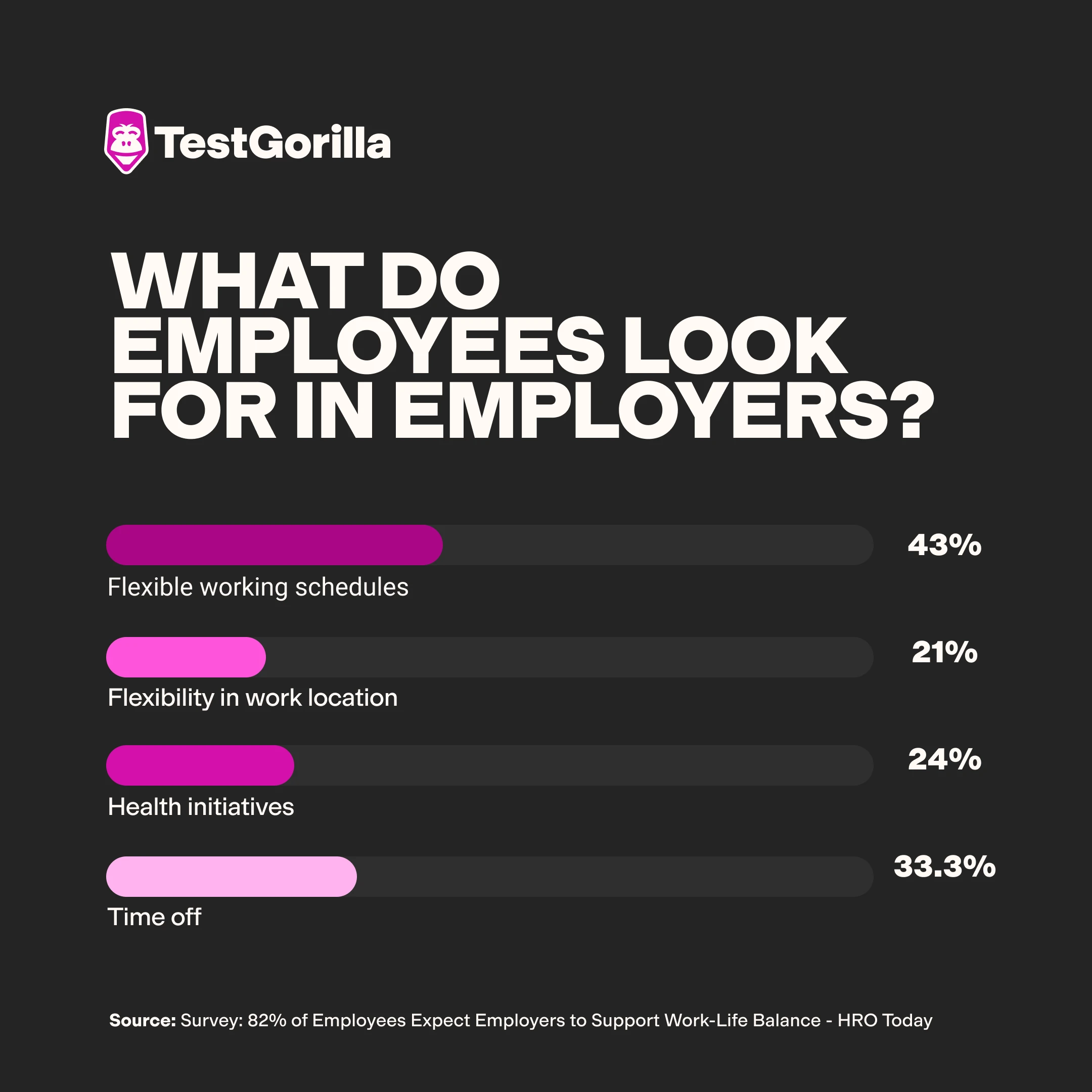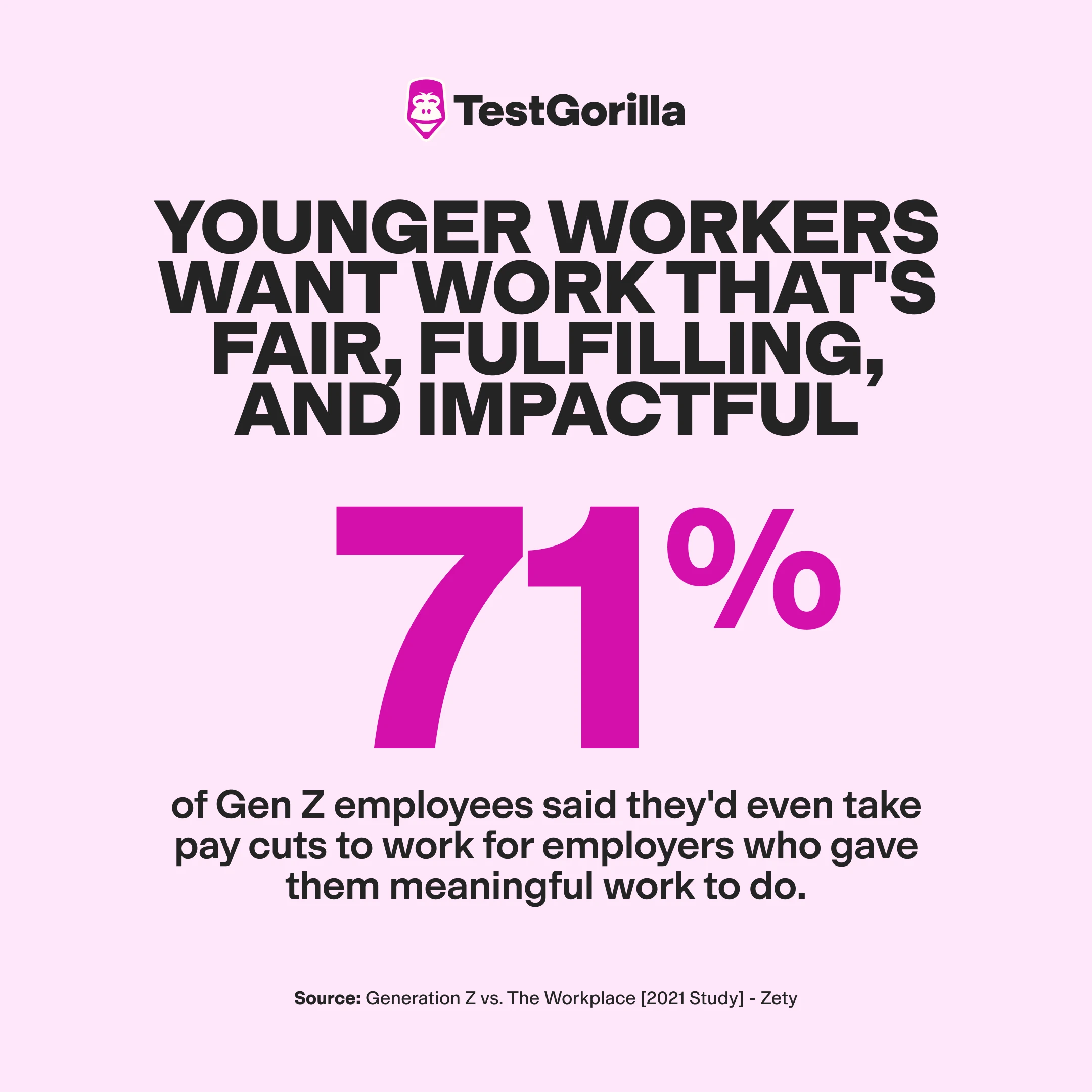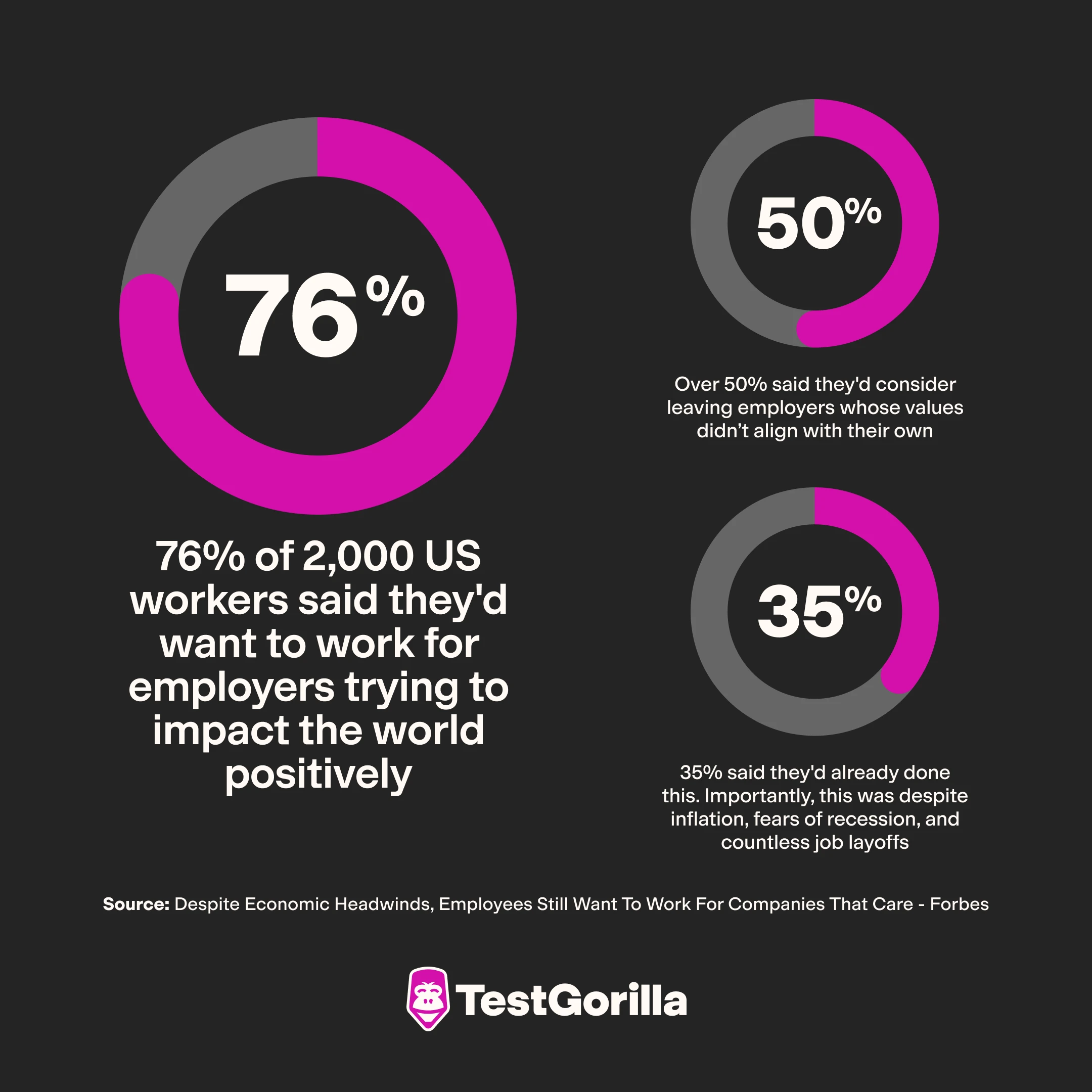The definition of a good employer has changed significantly over time, especially since the COVID-19 pandemic. Where “good” was once synonymous with high pay, today's talent wants more than just money.
The tricky part? Employers are still focusing on things employees no longer care about, and it’s costing them their best people. But don’t sweat it – we’re here to help. Below, we show you what being a good employer means today from both the employer and employee perspectives. Plus, we’ll share tips on how to boost your employer brand and become the kind of company people want to work for.
The evolution of a "good employer"
What employees look for in "good employers" has changed considerably over the last two decades – driven largely by external factors.
We spoke to HR and hiring expert Yashna Wahal, who highlighted some notable changes.
Employees from the early 2000s placed significant value on pay and job security. Workers sought higher compensation to recover from the stagnation or losses from the early 2001 recession and the dot-com bubble burst.
Separately, the early 2000s saw the rise of globalization, with companies expanding across borders. With the world suddenly becoming their oyster, employees were vying for jobs at multinational corporations that could offer international experience and exposure.
Today, things look very different. Rapid technological advancements, changing workforce demographics, and the after-effects of the COVID-19 pandemic have changed what employees are looking for from their roles and companies.
Let's dive deeper into what makes a good employer today.
What makes a good employer today?
Here's what good employers bring to the table today, according to employees and employers.
Work-life balance
Growth opportunities and supportive managers
Purposeful work
Financial security
Autonomy and empowerment
Transparency and trust
Fun perks
Recognition and job fulfillment
Focus on skills
Social responsibility, diversity, and inclusion
The employee POV
The tight labor market (where there are more open roles than skilled workers to fill them) has shifted more power to employees and job seekers, and this is expected to continue according to a recent report by McKinsey.
Even more compelling – Laura Salton, Talent Acquisition Specialist at TestGorilla, believes this change will last regardless of market dynamics.
There has always been a certain level of fluctuation between employers and employees holding the power and choice in the hiring market. But even in times of uncertainty, employers are being held accountable, more so now than ever before.
Therefore, you must pay close attention to what employees deem good employer qualities to attract the best talent and beat your competition.
Here's what we’ve uncovered regarding employee perspectives.
Work-life-balance
During the COVID-19 pandemic, much of the global workforce worked from home, enabling them to spend time with loved ones, engage in personal hobbies, and prioritize their health. The desire to continue this work-life harmony has continued, even as the pandemic has largely come to an end.
A study published in HRO Today revealed that a staggering 82% of employees expect good employers to support work-life balance, and 90% consider employers' well-being initiatives when making decisions about where they want to work.
According to the study, here's what employees are looking for specifically.
Flexible working schedules: For 43% of respondents, this benefit significantly impacted their well-being. They want the freedom to choose their work hours or shifts so long as work gets done.
Flexibility in work location: Twenty-one percent mentioned they wanted the freedom to work from where they wanted. This was also seen in a 2023 Deloitte survey – where a majority of 22,000 millennial and Gen Z workers preferred hybrid work.
Health initiatives: Twenty-four percent of employees wanted free healthy meals, while 16% wanted better health insurance and access to on-site gym facilities.
Time off: A third of respondents desired more vacation days to get some downtime from the stresses of work and personal errands.
Growth opportunities and supportive managers
According to O.C. Tanner, an employee recognition specialist, millennials and Gen Z workers highly value professional development and look for growth and a "sense of mastery" in their jobs. Seventy-four percent are even willing to move to other employers who provide better career advancement opportunities.
Another study showed that seven in ten employees rate learning and development as the same or more important than promotions. The study also highlighted that employees want this career support from their managers. McKinsey found the same in a study of frontline employees – 73% of whom wanted managers who supported their career progression.
Why is this happening?
The University of Phoenix analyzed 5,000 employees and 500 employers – and found that 52% of workers are afraid of their skills becoming “outdated” because of automation, AI, and other advancements in technology. The index also found that over 65% of workers would stay with their employer throughout their career if the employer made an effort to upskill or reskill them.
Purposeful work
Millennials and Gen Z employees make up most of today's workforce, and one big thing they want from good employers is meaningful and purpose-driven work. Purely financial incentives no longer drive them – they want to do something that lets them give back to society, the environment, and more.
According to the World Economic Forum, younger workers want work that's "fair, fulfilling, and impactful."
And Gallup, an analytics company, says that 67% of millennials want to work for companies whose missions they're aligned with. Another McKinsey report also showed that when employees feel the purpose of their role aligns with a company's mission, they're more engaged and loyal.
The most shocking part? Seventy-one percent of Gen Z employees said they'd even take pay cuts to work for employers who gave them meaningful work to do.
Financial security
Though some employees express willingness to accept reduced pay, still others rely on good, fair pay. As the cost of living continues to escalate, research shows that 90% of employees are worried about basic living costs, such as housing, food, and transportation – and 40% are living paycheck to paycheck.
As such, they want to work for employers who ease some of their employees' financial burdens and provide them with a sense of security.
According to WorkRamp, a learning platform, 64% of employees consider increases in income and benefits when choosing an employer.
Additionally, Liz Fealy, EY Global People Advisory Services Deputy Leader and Workforce Advisory Leader, says:
Even with the current economic turbulence, more than a third of the workforce is still looking to change jobs in search for better pay to keep up with inflation and an employee value proposition that fits their post-pandemic life and priorities.
Moreover, Commonwealth, a financial securities company, discovered that over 70% of employees want to stay with employers who offer them savings tools, such as emergency savings programs with or without matched contributions.
Autonomy and empowerment
In addition to wanting the flexibility to work when they want, employees look for employers who give them the freedom to work how they want. The desire for autonomy runs so deep that one in four UK employees are considering switching from full-time employment to becoming freelancers according to Forbes.
Harvard Business School also published findings showing that employees from Western societies – like the UK, US, and Germany – prefer more independence and less intrusion from their employers.
This sentiment was mirrored by our very own Silvia Pellegrino, a customer success advisor at TestGorilla. Taking an employee's perspective, Silvia shared –
I've always believed that a good employer creates a supportive environment built on trust and growth. They don’t feel the need to constantly monitor or micromanage their team, knowing their employees will get the job done well and on time.
Transparency and trust
Forbes recently pointed out that many employers don't focus enough on providing more transparency in the workplace. This is problematic because employees want in. They want to know what's going on, how decisions are being made, and how they can contribute to solutions.
In fact, a survey by Slack showed that over eight in ten employees want a better understanding of how employers make decisions, and 87% of job seekers prioritize transparency when considering future employment opportunities.
HR and hiring expert Yashna Wahal shared some first-hand experience about this:
Employees don't want to be kept in the dark – especially when there's already a sense of uncertainty and instability looming in the economy. In my experience, all they want is an employer they can trust and honest leaders who keep their word.
If you communicate openly, you'll be surprised to see how far they’ll go to stand by you – even when times are tough.
The employer POV
While the above qualities might seem obvious to some, data from Indeed reveals that employers don't fully understand what employees seek. This gap in what employers and employees think makes a good workplace is called The Great Disconnect.
Why should you bother learning what companies think are the top qualities of good employers? Because although these might not be a priority for workers, other employers are probably providing them anyway.
Exploring what employees want and what competitors are doing gives you a complete picture of what good employers look like, enabling you to stay ahead of the curve.
Here’s what employers think makes employers “good.”
"Fun" perks
One article by the Society of Human Resource Management (SHRM) gave a great example of The Great Disconnect.
Google has free meals. Quicken Loans offers arcade games. Salesforce.com provides treadmill desks. When we think of great places to work, we often focus on the perks and benefits that make a workplace more fun, convenient or flexible.
But talk to people who study, build or just work at great workplaces and you’ll find that pay, benefits and perks are only part of the story.
Fun perks may be only part of the story, but they exist nonetheless, and some employees appreciate them. An article about "beer Fridays" – a popular trend in the start-up world – outlines that 77% of employees believe that such company events build a positive workplace atmosphere.
Recognition and job fulfillment
Employers know that their team members want to feel fulfilled and seek growth opportunities. Unfortunately, according to a study by McKinsey, they put a premium on these benefits, – prioritizing them too much relative to their importance to employees.
This means they offer these intangible benefits at the expense of other things workers need. For example, they might give internal employees stretch projects or additional work without fair compensation – assuming that challenging work coupled with a pat on the back is enough.
Should you offer growth opportunities? Yes. Should you praise employees' performance? Also yes. But ensure you don't do this instead of what's most important to them, including fair pay and work-life balance.
The overlap
Finally, despite the so-called Great Disconnect, there are some qualities of “good” employers that both companies and employees agree are important.
Focus on skills
A growing number of employers believe focusing on skills and merit over employees' backgrounds and educational degrees is both ethical and good for business. This skills-based approach manifests in how employers hire and make decisions – such as who to promote and who to give opportunities to.
In fact, our latest State of Skills-Based Hiring Report showed that 81% of over 1,000 employers used skills-based hiring in 2024, compared with 56% just two years before. It's clear that more companies believe a focus on skills makes them better employers.
What's more – employees want their employers to hire for skills. Nearly 70% of job seekers prefer skills-based hiring, and nine out of ten candidates think they'll secure their dream job because of it.
Beyond hiring, McKinsey also found that frontline employees wanted their employers to give them work that maximized their current skills and allowed them to learn and build new skills.
Social responsibilities, diversity, and inclusion
In a survey commissioned by former Unilever CEO Payl Pokman, 76% of 2,000 US workers said they'd want to work for employers trying to impact the world positively – ones they perceive as socially and environmentally conscious.
Additionally, over 50% said they'd consider leaving employers whose values didn’t align with their own, while 35% said they'd already done this. Importantly, this was despite inflation, fears of recession, and countless job layoffs.
Another survey by CNBC and SurveyMonkey found that 80% of employees wanted to work for employers who value diversity, equity, and inclusion (DE&I). This was driven by the social implications and benefits of diversity (like innovation).
What about employers? Research by the University of Northern Iowa showed that 90% of businesses listed on the S&P 500 invested in corporate social responsibility (CSR) initiatives – for instance, decarbonization and community grants – in 2019 compared with just 20% in 2011.
Another report found that 94% of employers said they were committed to advancing DE&I in the company.
The best insights on HR and recruitment, delivered to your inbox.
Biweekly updates. No spam. Unsubscribe any time.
3 simple but effective tips to build a reputation as a good employer
Keeping the above "good employer" qualities in mind, here are some practices you can adopt to become a better place to work and build a strong employer brand.
1. Provide skilled-based opportunities
We spoke to Romina da Costa, director of IP development at TestGorilla, about the best way to become a good employer. Romina advised –
In the age of skills-based hiring, a great employer focuses on creating a culture of continuous learning and development. They prioritize giving their employees opportunities for upskilling and reskilling, they recognize and reward skills over traditional credentials, and they offer career growth based on merit.
Here are some ways to center your organization on skills.
Emphasize your skills-based hiring approach to job candidates by writing skills-based job descriptions that focus on individuals' capabilities rather than educational degrees and backgrounds.
Screen your job candidates using fair and objective talent assessments instead of resumes, which tend to overemphasize the importance of degrees, are difficult to verify, and are prone to unconscious biases.
Use skills mapping for insights into employees' skill sets, existing skills gaps, and opportunities for upskilling and reskilling.
Provide tailored learning and development opportunities to boost employees' careers and improve performance.
Offer skills-based compensation to new hires, for promotions and raises, and for stretch projects and additional work.
🔍 Want to learn more about skills-based hiring? Sign up to access our free skills-based hiring handbook.
2. Offer flexibility and autonomy
Many employers have put return-to-work mandates into place in 2024 – including big names like Amazon, Dell, and Goldman Sachs – according to a recent Forbes report. Ninety-one percent of employees are dissatisfied with these mandates.
Instead of fighting employees' push for flexibility and work-life balance, find a balance between offering remote or hybrid work and boosting productivity. For example, provide good technology and sufficient opportunities for social interaction and team building.
🔍 Interested in learning more? Read our complete guide to balancing hybrid work strategies.
In addition to flexibility, provide employees with a sense of ownership and autonomy in their work. Empower them to take ownership of projects, have a say in important decisions, and manage their own day-to-day tasks – so long as they meet standards and deadlines.
That said, don't throw them into the deep end. Continue to offer support, guidance, and mentorship when they need it.
3. Lead by example
Exemplify your corporate values, live by your mission, and stay true to your word. Here are some ways to do this.
Communicate your core values
Our talent acquisition specialist Laura Salton says, "There needs to be a well defined mission and clearly laid out vision of where the company is going. This… allows any employer to know where they stand and what their part in the long term success looks like."
Additionally, ensure your values are at the heart of business decisions and your leaders practice and embody them. This helps strengthen employees' connection with you as an employer and establishes trust.
Promote transparency
Maintain open lines of communication between employees and company leaders. In addition to sharing the company's goals, be transparent about challenges and involve employees in decision-making to foster a sense of shared responsibility.
Show genuine interest in CSR initiatives
Today's employees can pick up on BS and lip-service very easily. It's better to focus on fewer, more impactful CSR strategies and actively participate in them as company leaders.
Additionally, create opportunities for employees to contribute – whether it's volunteer days, sustainability initiatives, or diversity efforts. This helps employees find a sense of purpose at work and shows them you care about doing what's right.
Stand out as an employer of choice
The concept of a good employer has evolved over the years and is different for employers vs. employees. While employers think providing perks and recognition is the key to a good reputation, employees are more interested in work-life balance, autonomy, growth opportunities, and financial security.
However, both sides see a focus on skills and social responsibility as top qualities of good employers.
By providing skills-based opportunities, fostering a culture of continuous learning, offering flexibility, and leading by example, you can stand out as an exceptional employer – and attract and retain the best talent in the market.
Related posts
You've scrolled this far
Why not try TestGorilla for free, and see what happens when you put skills first.


















